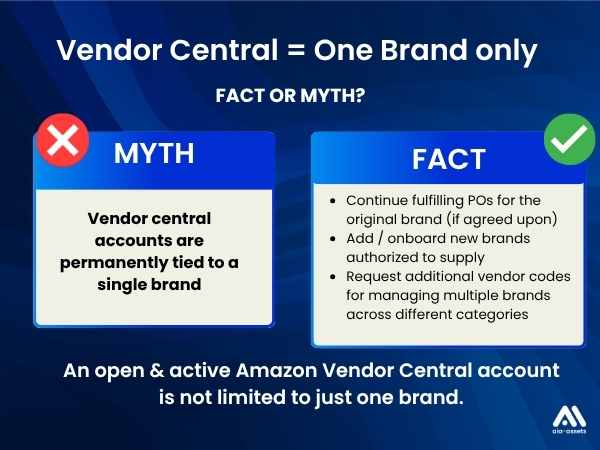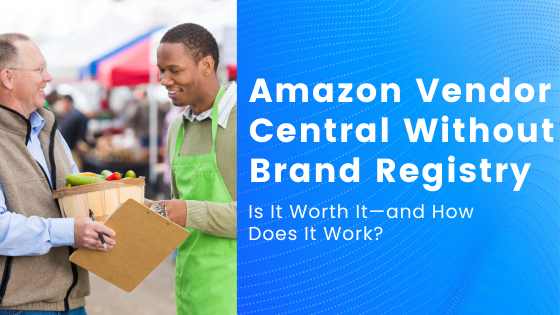For many sellers and brand consultants, the idea of buying a Vendor Central (1P) account without owning the original brand seems confusing—maybe even pointless. After all, isn’t every Vendor Central code tied directly to a specific brand?
It’s a fair question—and a common one. But the reality is more flexible (and more strategic) than you might think.
Truth or Myth? Vendor Central = One Brand Only
Vendor accounts are mainly created with a brand. But here’s the key: once the Vendor account is open and active, it’s not permanently tied to just one brand. The account holder can:
Continue fulfilling POs for the original brand (if agreed upon)
Add new brands they’re authorized to supply
Even request additional vendor codes for managing multiple brands across different categories

One of the biggest misconceptions about Vendor Central is that your vendor code must be tied to your own private label brand. That’s not the case.
In fact, many Vendor Central accounts operate as authorized suppliers for established third-party brands. The brand doesn’t have to be yours—you simply need to have the right to supply their products to Amazon. This is common practice, especially in categories like grocery, electronics, or health & beauty, where distributors and wholesalers serve as 1P vendors.
So when you acquire a Vendor Central account, you’re not limited to creating or managing your own brand. You can use the account to supply products from any brand you’re authorized to represent—and still receive purchase orders directly from Amazon.
In short, once you’re in Vendor Central—you’re in. The infrastructure is yours to build on.
So What Happens Without Brand Registry?
While having Brand Registry certainly helps build brand protection and control, it’s not required to operate within Vendor Central.
If you’re buying a standalone Vendor Central account without the original brand:
- You won’t be fulfilling POs for that original brand
- But you can onboard new brands—either ones you own or are authorized to represent
- The account gives you a head start, avoiding Amazon’s lengthy and often opaque 1P approval process
This is exactly where AIA Assets comes in.
At AIA Assets, we don’t just sell Vendor accounts—we match infrastructure with opportunity.
We acquire both accounts that come with active brands as well as clean accounts that no longer operate under their original brand. Why? Because we work with:
- Sellers and agencies looking to help their brands scale into 1P
- Brands actively transitioning from 3P to 1P, but lacking the backend access
- Buyers who want to skip the red tape and plug directly into the 1P system
The result is a secure, vetted, and strategic solution for everyone involved.
It’s about relationships, not ownership. And with the right setup, you can run a highly profitable 1P operation without ever needing to register a private label brand.
For the right buyer—someone with brand relationships, supply capability, or a solid 1P growth strategy— buying a Vendor Central account without a brand registry can be a powerful asset and a serious head start.
Ready to explore what a vetted Vendor Central account could do for your business? The team at AIA Assets is here to guide you.

